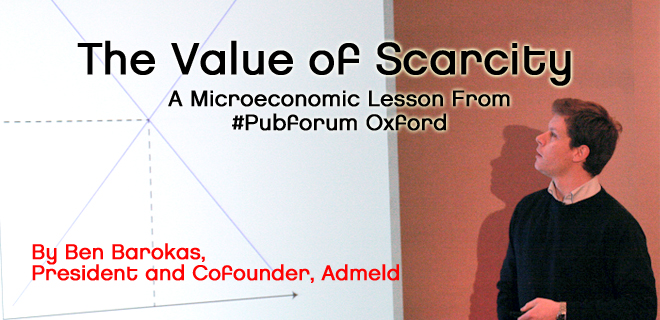
Oxford is a city that promises to broaden the mind. My thoughts on what makes a great publishing business were certainly enlightened by Greg Taylor, one of the keynote speakers at the AdMonsters Publisher Forum at Oxford.
Greg has his Doctorate in Economics and is a research fellow at the Oxford Internet Institute. Greg uses economic tools to understand the functioning (and dysfunctioning) of the Internet advertising market.
During his keynote Greg made some astute observations about which factors drive the price of impressions up, which is where publishers want it to go, and got us all thinking about the economics of industry we were in.
Just as the railroad pioneers in the U.S. thought they were in the train business rather than transportation business and so lost out on much market share to the trucking business, he said, so publishers need to stop thinking of themselves as being in the content business: what they are really in is the audience attraction business. They attract consumers using content and then lease that audience out to advertisers.
Perhaps the most relevant part for ad ops folks were his views on basic economic principles. If price is determined by supply and demand and higher prices are paid for assets that are scarce then the challenge for premium publishers is clearly to create scarcity.
That’s harder than it sounds in a world of unlimited inventory but it highlights the fact that adding another ad slot at the bottom of the page might not be the right strategy.
At the same time ad ops experts have to deal with the fact that greater targeting can be a demand limiter since effective targeting means fewer ads are available to reach a required goal. Thus equilibrium is to be searched for.
One weapon ops has is offering exclusivity in deals that are data-infused – be it for audience, content, or even wider extension-type deals. Sticky content, says Taylor, buys an exclusive share of attention and can be viewed as a device to mitigate the adverse effects of targeting and creating scarcity at the same time.
There’s no reason to believe that engaging with consumers has become any less valuable but publishers need to look at their data and understand what really attracts consumers to their sites. That will help them focus on what content actually generates an audience and how they boost their audience attraction metrics.
My own view is that data is an effective tool for creating scarcity onto impressions. With data availability currently poor across the EU, additional information about users and their behaviour – subject to all the necessary privacy regulations – makes impressions very scarce indeed.